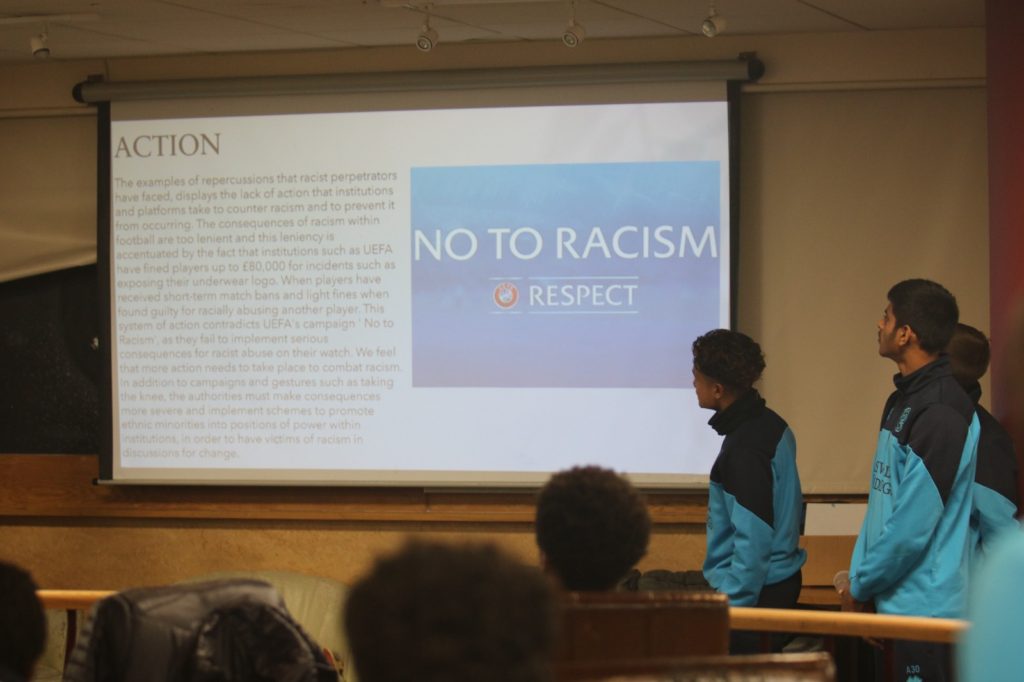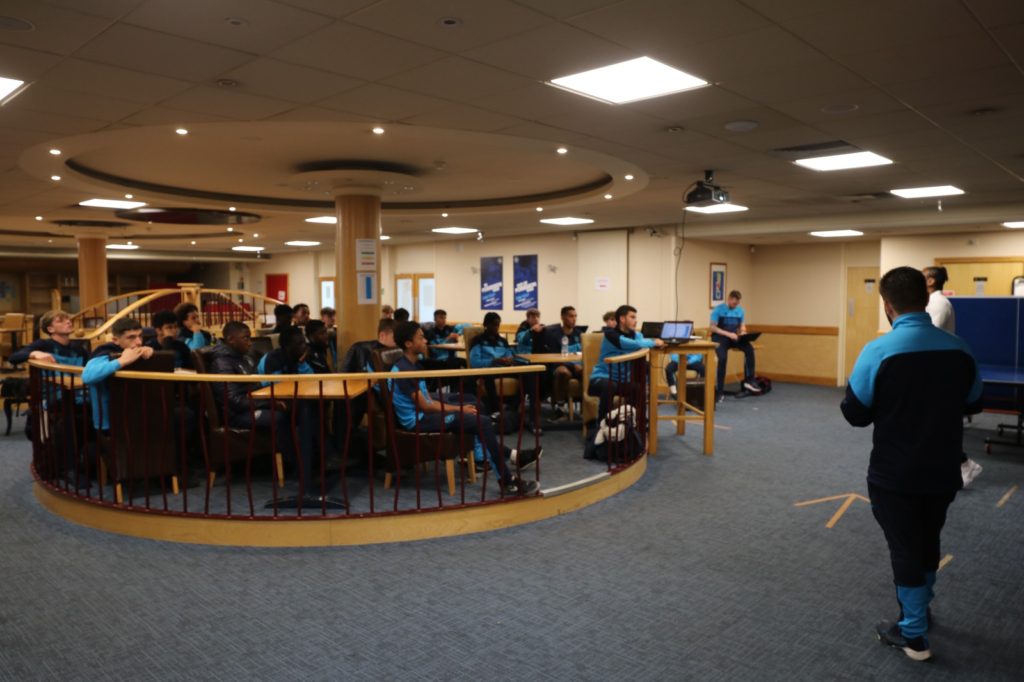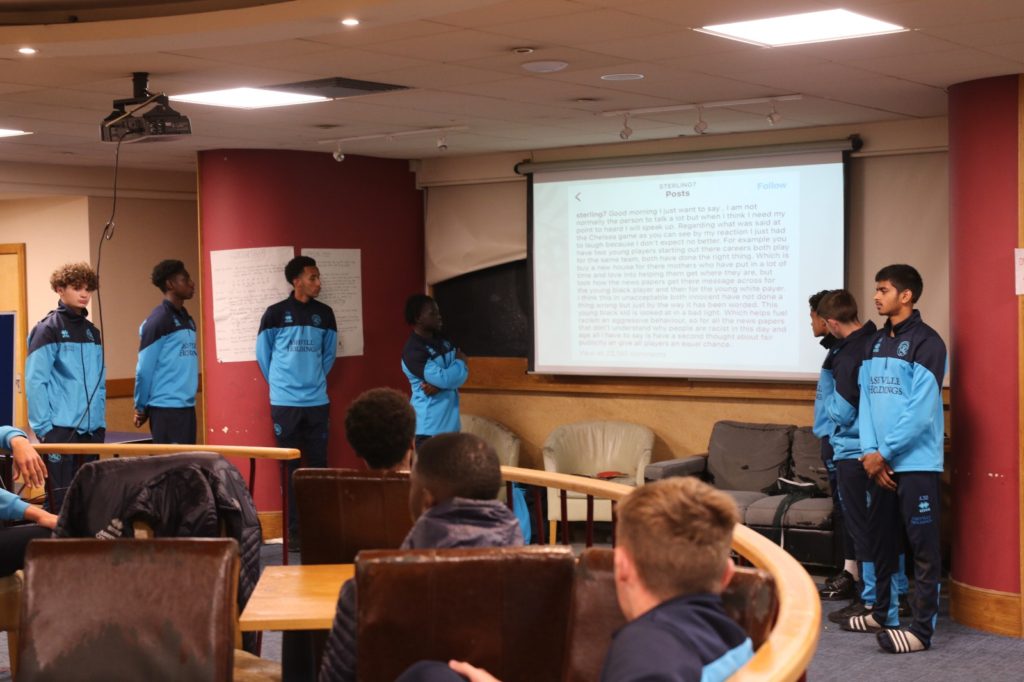Latest News
QPR START Football unItes project
December 2023
Who’s Thinking About Player Care and the Rights of the Employee In Football?

Why is it OK for Jadon Sancho to be publicly humiliated by his Manager?
Would you accept similar treatment from your employer?
Written by Bev Amaechi, CEO Player Voice CIC
I’ve been thinking a lot about Jadon Sancho and what he might be going through at Man United. Three months into being excluded from the team and we all look on, like this is normal behaviour and just how football is.
Not so long ago, Jadon was a child in the academy system, now he’s a young professional in the early days of his career, our bright “homegrown talent”. I reflect on what we consider acceptable treatment in the football industry and ask who is concerned about players’ welfare and wellbeing.
Those who understand football know players just want to play.
So taking a look at what is happening to Jadon now starts with last season when Man United reported that he spent three months battling physical and mental health difficulties, with Ten Hag at one point saying the England international was ‘not fit enough to play’.
Isn’t it then a reasonable conclusion that Man United’s punishment to Jadon could be perceived as cruel, as people who work within football know that this treatment is hurtful to the player both mentally and physically?
Headlines such as ‘banished’, ‘banned’, ‘exiled’ and ‘isolated’ are written as if this is normalised acceptable treatment. Gary Linekar, however, reported in the Manchester News as saying Ten Hag’s actions are “unacceptable” and a “no no” during his own playing career, showing that people are starting to question this treatment.
I can only imagine the scene at Man U training ground… “oh there’s Jadon again, on his own again”, maybe he’s grabbing a sneaky chat with a teammate, but nods and winks are the new language.
It must surely feel wrong to other players, wondering that if they step out of line and express an opinion which contradicts the manager, this might happen to them too. What message does it give to younger players and their families who may be facing their own challenges with their clubs? What message does this instil to young players as they grow up in football?
So as Jadon continues to seek strength to see through this time, I really am totally dismayed that not more is being done to uphold his rights as an employee by the industry powers.
Whilst I understand the PFA has offered some mediation support, what are safeguarding departments saying and doing in The Premier League, the FA, even FIFA? Am I missing something?
The media and its bias narratives
When there’s a performance issue in football, why is it ok to publicly say something negative about the player to the media? Everyone in football knows how the press and the haters twist and thrive off of these narratives to put players down. So I ask again, who is really protecting the young players, pros and young adults? How does the truth really get conveyed and where is the nuance and the balance of these real-life stories that have real human beings behind them?
Why is it if a player dares to speak up and give account of the situation, after the manager first expressed negative comments publicly, that everyone appears to be on the side of the club, not the player? Cristiano Ronaldo also left the club soon after expressing his criticisms, saying that he felt ‘let down’ by the club and Ten Hag’s lack of ‘empathy’.
In other professions, matters are dealt with privately or within the organisation. People have all kinds of issues and challenges at work that aren’t so easy to solve or reach a resolution on, but in football, the public factor adds another type of pressure, is humiliating and does not consider the mental health and wellbeing of the employee.
Of course, I am not aware of the whole story, but at a basic level, it should be the job of the club to protect players, especially when they are so vulnerable to attack and abuse when issues go public.
It gives the message –
‘put up, stay quiet’ and in other words:
‘your rights (you) don’t matter’
As CEO of Player Voice and Mum to a young professional who passionately believes that young players need to be supported to develop as effective communicators and responsible leaders, who act as ambassadors for their clubs and communities, I ask these questions with a new lens.
1. Is it safe to have player voice?
2. When, if ever, is it safe to speak up?
3. How could your career be negatively impacted if you speak up?
These are serious concerns that are questioning our human rights and right to be safe at work. What message does this give to other players in the industry who have employment concerns with any club?
I wonder how clubs have conversations with managers and coaches about these issues to prevent information and disputes getting to the media. How do clubs safeguard players and their confidentiality? Everything is so controlled at club media, it begs the question ‘who decides which narratives get told to the press?’ and ‘how much influence do clubs have on the stories that get published?’
With Jadon’s football pedigree, you could say he has more power and authority to have a voice than less established players. He also spoke out publicly to show support for George Floyd and the Black Lives Matter movement, using his platform to show support for social justice causes and standing up to racism in sport and society.
How are players treated when they aren’t at the top of their game?
So let’s say Jadon had a few bad days on the training pitch, let his work ethic and performance slip, has a slight injury, slept poorly or just isn’t feeling one hundred percent… He’s a human being who’s not in perfect condition 365 days of the year, just like other athletes and non-athletes. Surely there should be room for this basic humanity in the sport?
Do we look at professional, famous footballers as humans and not robots or commodities? Can we have empathy, understanding and feel angry on their behalf if we put ourselves in their shoes? Does earning a significantly high salary take away our right to fair treatment in the workplace?
In the real work world, show me one person who has never taken a fake sickie, not been prepared for a meeting or has not been quite on the ball at work. There should be performance systems and conversations to understand what support and actions are needed in addressing any grievances.
How would you feel if this was your child? What actions would you take if you were the Manager?
Jadon is 23 years old and has lived in a pressurised, competitive, ruthless football world since he was young. These continuous pressures and environments can have an impact on anyone, let alone a young person who’s grown up in this world.
For me, the bottom line is that he deserved full confidentiality from his manager and club, protection, support, and commitment to coming up with a solution that does not leave him ostracised from his team for 3 months.
So Jadon, I feel people at your club have let you down and feel concerned for all the other players who have experienced something similar, and for the young players coming through the system and what they understand their employment rights to be. Your experience highlights to me and Player Voice that there is so much to do, actions and solutions are needed to protect players’ rights and embed responsible leadership. It raises so many questions for the industry about player welfare, safeguarding and employee rights in football culture.
Jadon, I hope your love of football is still within you and when you are at your next club you will say it with your feet, but also still believe you have the right to fair treatment at work and know what the boundaries of acceptable behaviour are, as well as what your own responsibilities are as a player.
Player Voice (PV) is a small community interest company made up of parents, players, former players, youth mentors and facilitators and people who volunteer their time and work in sport to improve safeguarding practices and create leadership opportunities for young people. PV urges everyone who works in football at any level to put children and young people’s safeguarding and enjoyment in sport as their highest priority.
If you are interested in supporting Player Voice we would be keen to hear from you, please email: info@playervoice.org.uk
April 2022
On Friday April 1st 2022 Bev and Delali from PV will be presenting at the Safe Sport International Virtual Conference.
The focus for this year’s conference is Safeguarding: Knowledge to practise.
Bev and Delali will be talking about the importance of player’s voice in ensuring effective safeguarding, and sharing young people’s views and the experiences gained through participation in Player Voice projects. Bev said ‘developing a culture and systems within clubs and academies where players are encouraged and empowered to speak up, is part of an effective safeguarding strategy. One can’t exist without the other’.
They will share some headline results from the Player Voice survey (full results due in May 2022), to express young people’s views about their academy experiences, and will talk about the Football Unites programme and how this is making an impact in London academies and communities.
In the lead up to this conference, Bev spoke to academy partners and colleagues and we have a number of quotes of support about how player voice supports the important work of keeping children and young people safe in sport.
Rebecca Rowe, former Arsenal FC Player Welfare Officer who now is a consultant for PV on Football Unites project said:
‘Player voice needs to be supported at every level of the club, starting at the top. It is the players’ journey and as adults we need to listen to them more, learn from their ideas and perspectives. And let’s bring adults into coaching roles who are selected based on their values, not just their coaching competencies.
Safeguarding can’t operate effectively without encouraging athletes to speak up, showing them that we genuinely want to listen and help them in their journey’.
Stephen Quinn, Head of Education and Player Care at Queens Park Rangers Football Club said:
‘The recent involvement in Player Voice has led to a number of positive outcomes within our group of scholars. I have seen them take a keen interest in wider society especially on social issues. They have become more interested and invested in the workings of the community trust and we regularly join in activities that they run during half terms. Completing the Player Voice project will help them have a better understanding of the great work that our community trust do.
One of the issues that one of our groups focused on is Community Safety, it is clear that this is an issue that they are aware of and for some concerned about. The video they created help to highlight some positive safeguarding actions that young people can put into practice to help keep themselves safe out in the community.
Finally it has allowed me to see some of our young players talents outside of sport, including video production and editing. As well as their ability to hold positive discussions around major issues in their community/lives that affect them. Good luck with the event on Friday’.
Laura Baptiste, Head of Safeguarding at Crystal Palace Football Club expressed:
‘Player voice is a recognised part of the Premier League’s safeguarding and audit inspection process, overseen by Barnardos. At our club we work in a multi-disciplinary way with external partners, sharing knowledge to keep our players safe.
Safeguarding and player care staff come from diverse backgrounds and experiences, and we are not scared to lead the way in talking around issues, such as youth violence. New coaches coming in are knowledgeable about safeguarding and over the last few years I’ve seen big improvements and progress’.
‘Player voice is being able to talk about how you feel to people you trust in sport’. (U14)
November 2021
We’re thrilled to see QPR academy players get started on their ‘Football Unites’ project. All academy scholars (16 to 18 years old) are participating in the project and have already identified their social issue that matters most, with ‘Racism’ getting the top vote (57%).
Players made compelling presentations to their peers and academy staff to show their awareness of a number of social concerns, including mental health, social media, and county lines, but they felt that racism in football and in society stood out by far as an issue they want to address. We’re delighted that the academy players have already teamed up with QPR Community Trust, and are making plans together on how to best make an impact, with full support from academy staff and Player Voice.



July 2021
The Player Voice Team – A statement in solidarity against Anti- Black racism
We are proud of the England Football Team and everything they have achieved over the past few weeks. However, we must remain focused as we continue to strive for equality, fairness, and justice in both the game, and our society.
We take this moment to not only commend the team for their valiant efforts during the 2020 European Championships, but to stand in solidarity with the Black players who are now sadly in the firing line of racism, discrimination and hate crime.
Black players should not have to deliver results and wins to have their nationalities validated or viewed as human.
The long legacy of racism in sport has been an issue which has plagued the experience of many young players simply trying to do what they love, and efforts to raise awareness through taking the knee have been met with condemnation and hostility.
We can only tackle the problem of racism when there is first an acceptance that it truly exists and that it is acceptable to bring anti-racist politics into football. A passionate desire to eradicate racism from sport must first start within our society.
Therefore, we emphasise the statements released today by the Football Association and renew our commitment to ensuring players’ voices and existences are cherished within sport.
We will continue to support academy systems, work with governments, fund community development and cohesion through sport and lobby organisations – such as social media companies and sporting bodies – to introduce more stringent measures and better protect young athletes across the country.
We stand behind Gareth Southgate and the FA to condemn the racists who have directed abuse at the Black national players.
Only through togetherness can we impact change.
To have unity, we must have understanding and be willing to listen, learn and unlearn and act – always.
April 2021
The Athletic – Writes About The Football Unites Project
March 2021
Football Unites deemed a succes following the pilot programme
We are delighted to share this short film with you, showing what academy players did with their community partners, and how it addressed their top concern of ‘youth violence, gangs and fear of crime’ in London.
Football Unites is a player-led community engagement programme, which enables academy players to identify social issues which are important to them and collaborate with a local community organisation to tackle their concerns.
During 2020 Player Voice engaged with Crystal Palace and West Ham United football clubs to test out the pilot Football Unites programme, with support from Arsenal Football Club and the Premier League as advisory partners.
May 2020
271 academy players voted on social issues of concern facing young people in London.
38% said that Youth Violence, Gangs/Crime is the top issue facing young people in London.
25% said Racism and other forms of discrimination/prejudice and 16% said Mental/Physical health and wellbeing.
Other top issues of concern included child and family poverty and safety of travel around London.
Following the ballot, academy players from each club attended a meeting with the Mayor of London’s Violence Reduction Unit to share their views on the challenges facing young Londoners at risk of getting involved in crime and potential solutions.
The young players will use the ballot results to inform social action projects they will deliver as part of ‘Football Unites’ pilot – a new initiative between club partners, Player Voice and the Mayor of London.
Football Unites is a pilot project between October 2019 to October 2020 which engages over 40 football academy players from Premier League clubs in London to identify social challenges in their locality and co-design projects with community partners to tackle these.
Players are currently mid-way through the pilot.To see more information on the findings from the report.
